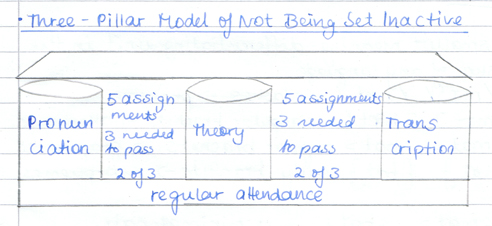
Participation: You may miss this class twice. Should you miss more often, you will be set inactive.
Goal of the class: This class is intended to introduce you to the practical application of the principles of English phonetics and phonology. We will be doing this by: learning how to write down English texts the way they would be pronounced; learning about what goes on in peoples' mouths when they speak (including possible inferences between German and English); and improving your pronunciation. Since the class has "active participation," there is no final test, nor will be there a grade.
Class language: Class language is English.
Exercises: You will be given practice texts on a weekly basis. These you will have to transcribe into phonemic script, or from phonemic script into English, acquainting yourself with the symbols of the International Phonetics Association in the process. You should bring your finished transcription to class the following week, where we will then discuss them. You will then also be given a sample solution for each text. Class work will also include work with texts aimed at teaching phonology and phonetics to children at high school, most of which will probably be done in small groups.
Active participation: To pass this class, you need to be present as described above. Also, you will need to participate in, and pass most of, a few sample tests and exercises that are intended to improve your facilities in the three areas also mentioned above: transcription, theory, and speaking. Per area, there will be a total of five (usually brief) assignments, out of which you are going to need to pass the majority (i.e., 3 out of 5) each. Once you have passed the majority (i.e., 3 out of 5) of two out of these three areas, I will consider your active participation fulfilled successfully. Finally, there is the portfolio (see below).
Oral examination: TThe general idea is that most of the activity you need to demonstrate your active participation will be done in class. This includes my assessment of your command of English. Should I find myself unsure of your pronunciation (meaning, you didn't say too much in class), there is the option of taking a five-minute oral exam towards the end of the term. I shall inform you should I consider this necessary. There is also the possibility of doing a recording of yourself at home.
Portfolio: The last part necessary for your active participation is that I get to see your course progression in written form. This portfolio should contain all the handouts given out by me, your sample transcriptions (including your corrections after discussion in class!), and your own notes. And the assignments as described above.
Failure: Should you fail to fulfil any of the criteria mentioned above (insufficient participation, not getting 3 out of 5 assignments right in two of the three areas, or not presenting a convincing portfolio), you will be set inactive to get the chance to try another day.

In case you ever need a phonetic font, you'll find one here.
These books might come in handy for this class, in various degrees:
Wells, J C 2008. Longman Pronunciation Dictionary. 3rd edition. Harlow: Longman.
 This book gives you transcriptions for (almost ...) every word of the English language. You will not be able to do your first transcriptions without one. This book gives you transcriptions for (almost ...) every word of the English language. You will not be able to do your first transcriptions without one. | |
Roach, Peter 1999. English Phonetics and Phonology. A practical course.. 3rd edition. Cambridge, etc: Cambridge University Press.
 This is a good introduction to the practical part of English pronunciation. Comes with interactive CD. This is a good introduction to the practical part of English pronunciation. Comes with interactive CD. | |
Pullum, Geoffrey K. & William A. Ladusaw 1996. Phonetic Symbol Guide. 2nd edition. Chicago & London: University of Chicago Press.
 Gives you a complete listing of all phonetic symbols available. Not actually needed for this class, and not for the faint of heart - but highly interesting! Gives you a complete listing of all phonetic symbols available. Not actually needed for this class, and not for the faint of heart - but highly interesting! | |